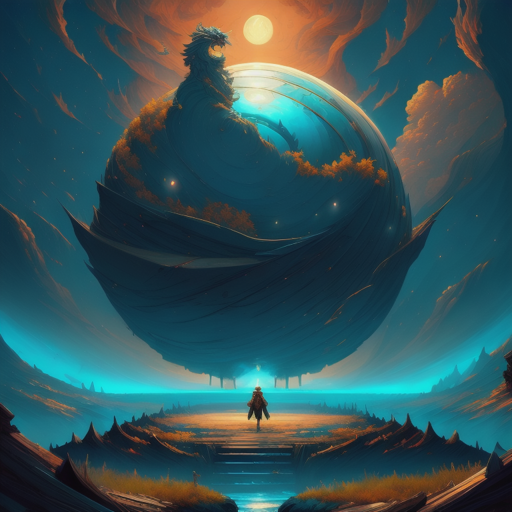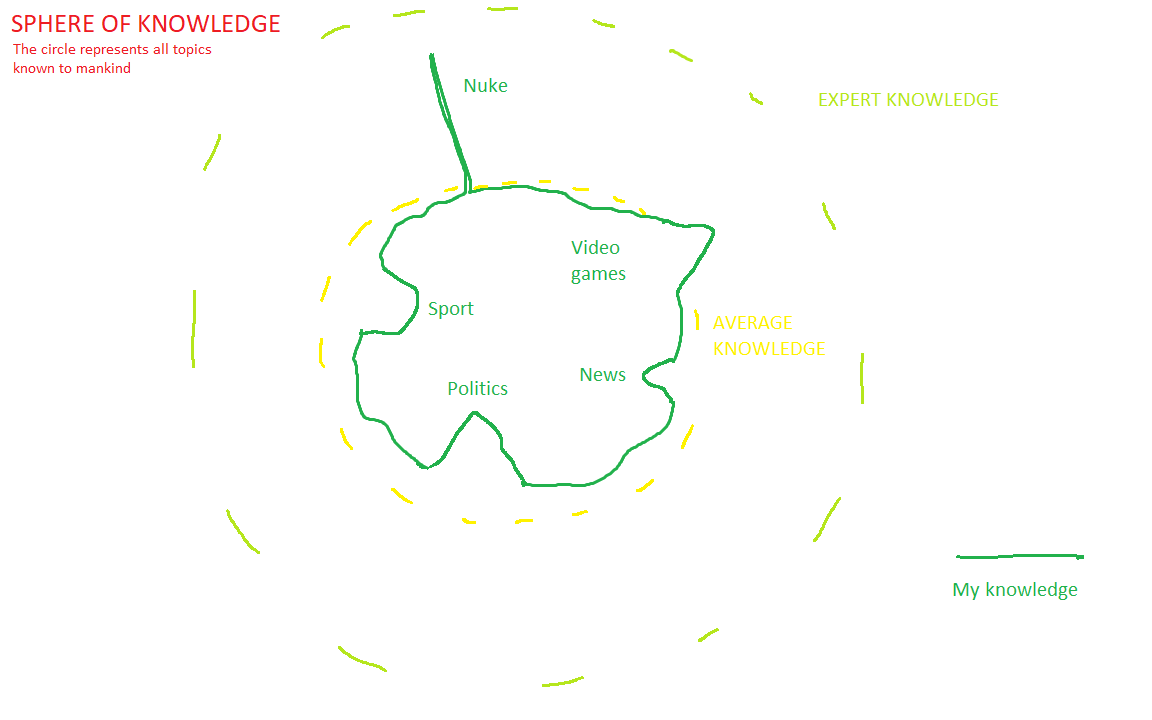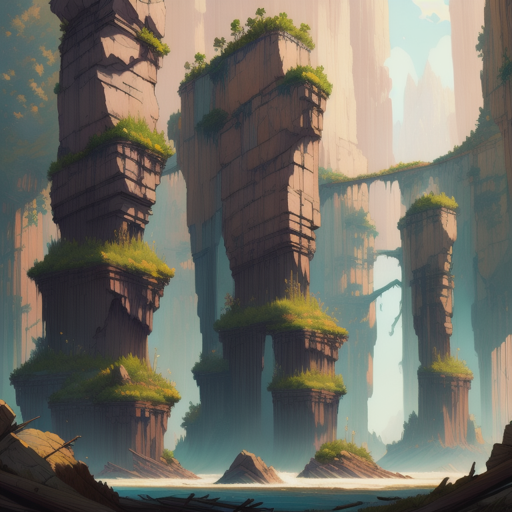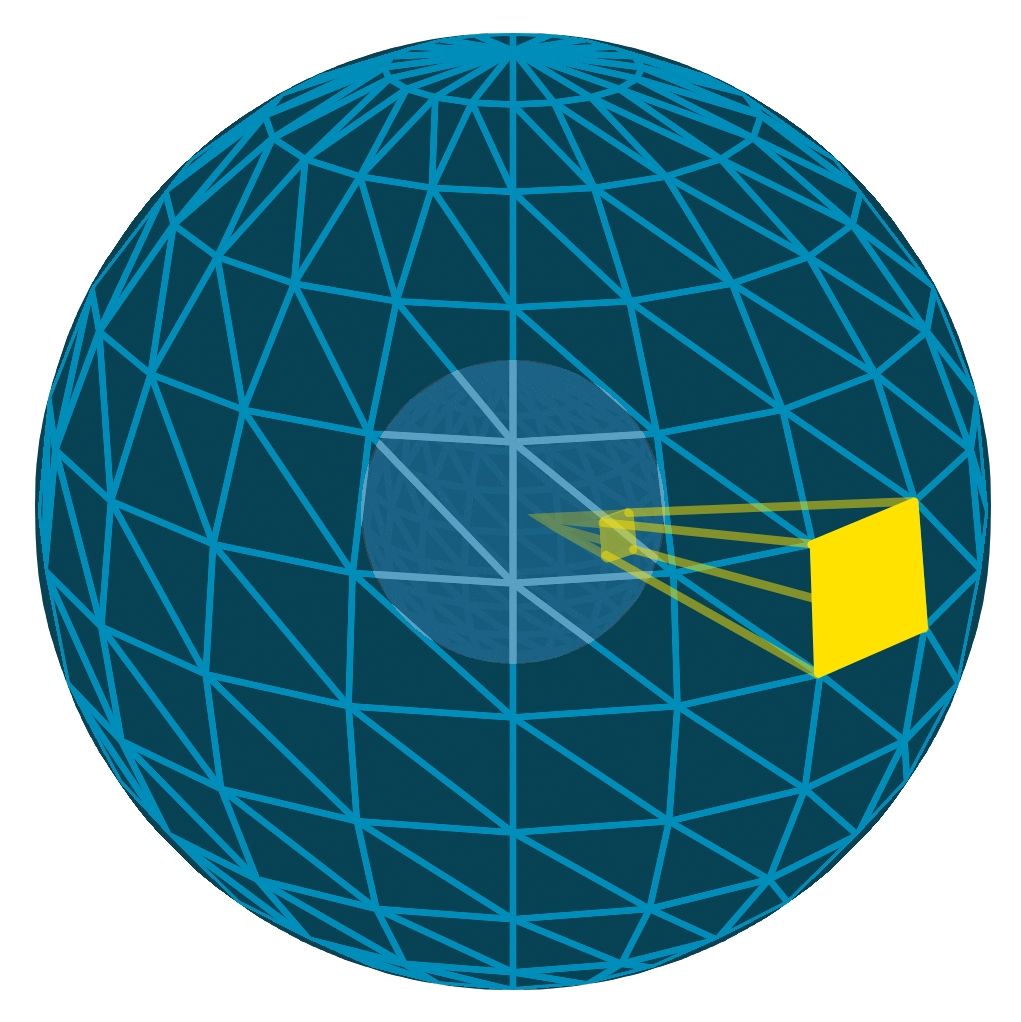The Sphere Of Knowledge
How to innovate through hyper-specialisation…

How to innovate through hyper-specialisation…
Imagine for a moment a giant sphere that represents all of our collective human knowledge.
Everything we know resides within its volume, and each sector of the sphere (a small 3D pizza slice, if you will) constitutes one area of knowledge. For example, our understanding of solar panels, skincare, or rotoscoping.
At the dead centre of the sphere lies complete ignorance. And as we climb towards the surface, we ascend through the layers of accumulated and discovered knowledge.
At the outer surface of the sphere we find the most specialised and state-of-the-art knowledge we currently have available. And outside of the sphere lies all yet undiscovered knowledge.

An AI-generated visual interpretation of the sphere of knowledge.
As you learn (more) about a subject, you forge pathways and climb out through the dense layers of the sphere.
And when you make discoveries and innovate in a field, you expand the sphere in that sector. You push the frontier of knowledge a step further away from ignorance.
Zoom in on an individual level, and you'll see that we all have our own, unique sphere of knowledge.
Let's say you're a jack-of-all-trades, for example. Your sphere might look fairly evenly round, albeit with a small to medium radius.
If you're more of a specialist in your field, however, your sphere might look more lopsided, reaching further out in certain sectors than others:
A Particular Set Of Skills
About a year ago, I sort of jokingly drew this picture:

I have a very particular set of skills.
I made that drawing for a bunch of friends in a WhatsApp group chat, who all used to work at the same VFX company.
The observation seemed to resonate with the group, and I think the reason it’s funny is because it's true.
My, and their, knowledge of Nuke and compositing is disproportionately greater compared to our knowledge of many other fields. – Because we have spent over a decade working in the VFX industry practising those skills.
Reflecting on that, I think as society advances – and more and more of people's basic needs are met – there is a natural increase in specialisation.
For example, I have no idea how to make a BLT sandwich – from scratch. As in, growing and harvesting the wheat, milling it to make flour for the bread, farming the lettuce and tomatoes, raising pigs, and so on.
There are professionals dedicated to each of those tasks. And they have become so efficient that only a relatively small number of people are needed to create food for the entire population. Just like how only a relatively small number of artists are creating entertainment for everyone.
Everybody doesn't have to farm or hunt their own food anymore (or make their own clothes, manually wash them, and so on and so forth) – for a very long time now. And that has opened up opportunities for working on other things.
Over time, that means that we’ve been able to hyper-specialise in our fields of choice. We've started to poke at the outer edges of the sphere of knowledge, and we've pushed through the membrane in many places. Which has led to great progress in those fields.
But as more and more people have blazed a trail to the surface of the sphere of knowledge and beyond, an interesting side effect has emerged:
Bridging The Canyons
With the increase in specialisation, you can imagine there are now these towering pillars of knowledge rising up from the centre of the sphere.
And in between them, there are deep canyons in the adjacent fields which have not yet been explored or meaningfully connected.

An AI-generated visual interpretation of the pillars of knowledge.
The wheeled suitcase wasn't invented (or at least made available to the masses) until after the moon landing, for example. And it didn't take the shape we know today (standing on its side, with retractable handles) until the late '80s.
People used to literally lug their heavy luggage around, not even that long ago. – Yet, long after both the wheel and the suitcase had been invented.
However, the canyon between wheels and suitcases was fortunately bridged, and the result has now become the standard for travelling.
Similarly, there are very likely advances in the fields of for example physics or AI that would be tremendously beneficial to the visual effects community.
Or, probably equally likely, there may be advances in other, completely surprising fields – which seem unrelated (to most people) – that could leap frog developments in visual effects.
Or yet, our advances in visual effects could prove beneficial in other areas.
So innovation is not only a result of expanding the height of the pillars, but also of connecting them together.
If you are able to connect knowledge from two or more fields via cross-pollination, that could turn out to be incredibly useful to a lot of people. Even if it would "just" be a quality of life improvement, like the wheeled suitcase.
To do that, it's useful to identify your areas of expertise.
Your Own Pillars
If you're unsure of which pillars you have personally scaled, that's quite normal.
What seems natural and easy to you, others may think is amazing. So it's a good idea to pay attention to, and internalise, any compliments you get.
I've realised I'm quite organised. Since I was a kid I've been able to untangle things and order them in a meaningful way. From helping my grandmother literally untangling her knitting yarn back then, to organising and combining ideas and subjects into articles today.
I like to make my Nuke scripts tidy and easy to navigate (highly recommend everyone do this). And I've gotten a lot of positive feedback from people who have opened them. Organisation comes quite naturally to me, but it doesn't for everyone. So that's one pillar I've climbed. (And it's closely connected to the pillar of analytical problem-solving skills).
You may have climbed other pillars. Listen for clues from others to help identify them. You could be standing atop pillars which are nearby each other. And when you make that realisation, you can connect the dots and potentially bridge a canyon of your own.
PS:
One thing I didn't account for in my simple drawing before, was the radius of the sphere.
As you go further out and away from the centre, the same slice of the sphere covers a much greater area. It's kind of like an upside down pyramid:

Further out, the same pillar covers a greater area.
I've found the same is true with knowledge: the higher you climb (or the deeper you dig), the more there is to find. And scaling a pillar can help you gain a bird's-eye-view for spotting more opportunities to build bridges.
So by hyper-specialising in your chosen field(s), you can help drive innovation on both axes: vertically and horizontally.
I hope you found this article useful. For more productivity tips & tricks, see Productivity.



